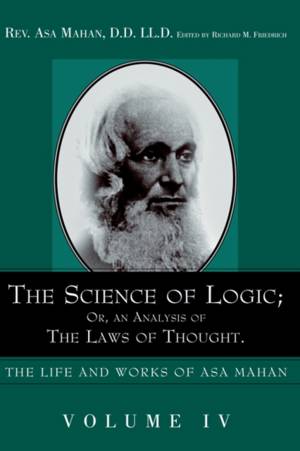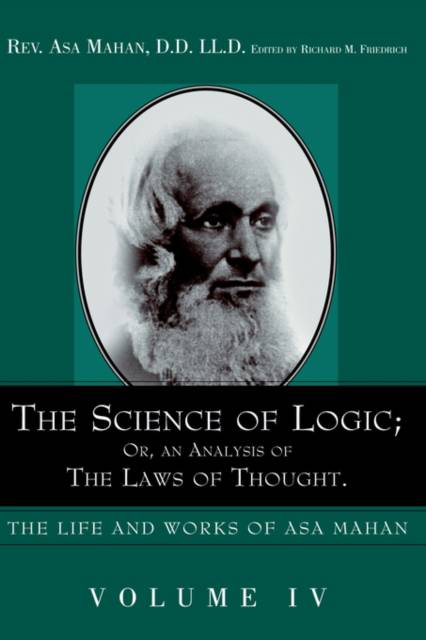
- Retrait gratuit dans votre magasin Club
- 7.000.000 titres dans notre catalogue
- Payer en toute sécurité
- Toujours un magasin près de chez vous
- Retrait gratuit dans votre magasin Club
- 7.000.0000 titres dans notre catalogue
- Payer en toute sécurité
- Toujours un magasin près de chez vous
Description
Whenever, in the development of any particular science there has been a misapprehension of its appropriate sphere, and especially when wrong principles have been introduced in development, a reconstruction of the whole science is of course demanded. The following treatise has been prepared in view of the assumption, that both these defects exist in important forms in the common treatises on this subject. Every one is aware, that any given intellectual process having for its object the establishment of truth, may fail of its end for one or more of the three following reasons: 1. The process may be based throughout upon a misconception of the subject treated of. 2. Invalid premises may be introduced as the basis of conclusions deduced. 3. Or there may be a want of connection between the premises and the conclusions deduced from them. All are equally aware, also, that every valid process is not only free from each of these defects, but possessed of the opposite excellences. In examining any such process, then, three questions are or should be always put, to wit: Has the author rightly apprehended his subject? Are the premises sound? Is there a valid connection between the premises and conclusions? In answering such questions, everyone feels the need of valid criteria by which he can determine whether the process is or is not valid in each of these particulars, and in one no less than in either of the others. The following treatise has been prepared upon the assumption, that the true and proper sphere of logic is to furnish all these different criteria, and thus to meet in full the real logical necessities of the human mind. ASA MAHAN (1799-1889) was America's foremost Christian educator, reformer, philosopher, and pastor. He was founding president of two colleges and one university, where he was able to inspire numerous reforms, publish authoritative philosophical texts, and promote powerful revivals like his close associate Charles Finney. He led the way on all important fronts while being severely persecuted. He introduced the new curriculum later adopted by Harvard, was the first to instruct and grant liberal college degrees to white and colored women, advised Lincoln during the Civil War, and among many other remarkable achievements, was a father to the early evangelical and holiness movements.
Spécifications
Parties prenantes
- Auteur(s) :
- Editeur:
Contenu
- Nombre de pages :
- 396
- Langue:
- Anglais
- Collection :
Caractéristiques
- EAN:
- 9781932370362
- Date de parution :
- 15-12-05
- Format:
- Livre relié
- Format numérique:
- Genaaid
- Dimensions :
- 152 mm x 229 mm
- Poids :
- 748 g

Les avis
Nous publions uniquement les avis qui respectent les conditions requises. Consultez nos conditions pour les avis.






